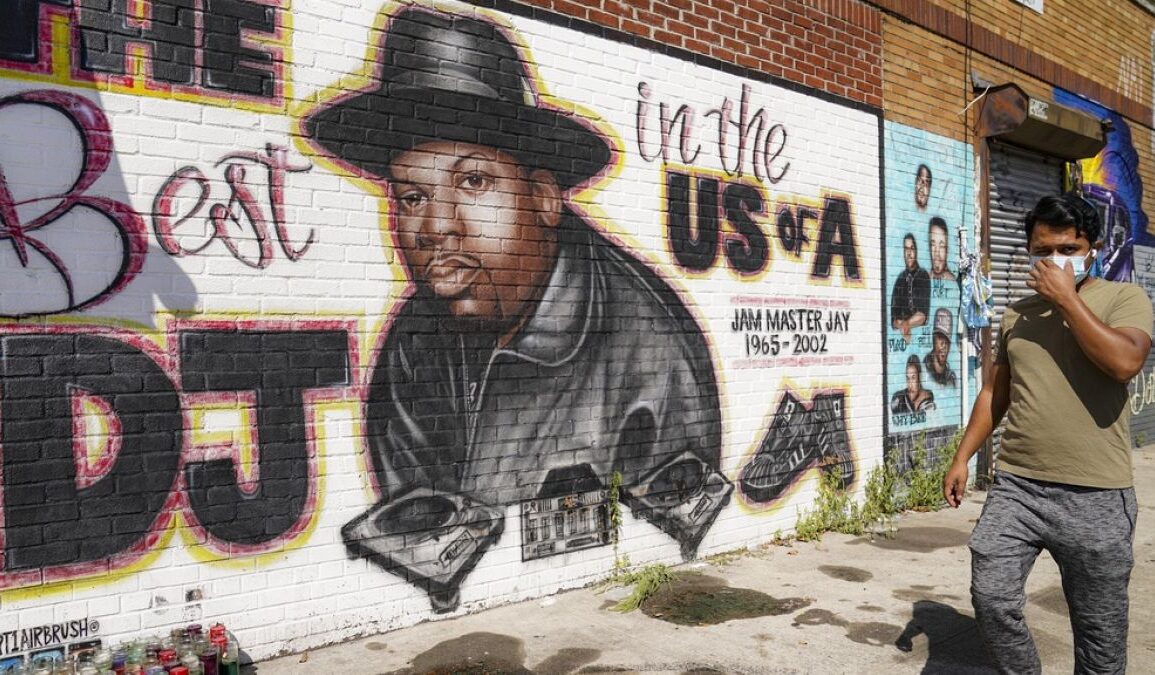The hip-hop star was killed in 2002 at his recording studio at age 37. Two men in his inner circle now face trial, accused of murdering him over a failed drug deal.
More than 20 years ago, Run-DMC’s Jam Master Jay was murdered in his recording studio in the New York City borough of Queens. This week, two suspects in his murder are going on trial.
The case had gone cold due to a lack of witnesses willing to cooperate, becoming one of hip-hop’s great unsolved murder mysteries – up there with the murders of Tupac Shakur and The Notorious B.I.G.
It wasn’t until 2020 that Karl Jordan Jr., Jam Master Jay’s godson, and Ronald Washington, a childhood friend, were arrested on suspicion of his murder.
In opening statements on Monday, Assistant US Attorney Miranda Gonzalez laid out the prosecution’s case against Jordan and Washington, who have both pleaded not guilty.
She told jurors that they would hear from eyewitnesses who were in the studio the night the 37-year-old hip-hop star was killed, who said they heard the pair confess their involvement.
“Each defendant was proud that they had taken down Jam Master Jay and got away with it,” she told the court.
Washington’s lawyer Ezra Spilke rejected the accusations, arguing the case was held together with “tape and glue” and that the prosecution had “no clue” who killed Jay.
“This case is about 10 seconds, 21 years ago,” he told the court. “It’s a blink of an eye, a generation ago.”
If convicted, the men face at least 20 years in prison.
“Greed and revenge” and a drug deal gone wrong
Jam Master Jay, whose real name is Jason Mizell, was instrumental in bringing hip-hop to mainstream audiences in the 1980s with powerhouse trio Run-DMC. He worked the turntables alongside rappers Joe “Run” Simmons and Darryl “DMC” McDaniels to produce massive hits like ‘It’s Tricky’ and ‘It’s Like That’.
Run-DMC were wildly successful – they were the first rappers with gold and platinum albums and a Rolling Stone cover. They were the first hip-hop group with a video on MTV and were inducted into the Rock & Roll Hall of Fame in 2009, seven years after Jay was murdered.
Despite the group’s outward anti-drug stance – their lyrics often proclaimed they didn’t do drugs and the group’s members appeared in televised “Say No to Drugs” campaigns – Gonzalez claims that Mizell had gotten involved in the drug trade in his later years, as his star began to fade.
Gonzalez said the DJ was often a middleman for sellers and buyers across the US, and that a few simple phone calls could earn him “hundreds of thousands” of dollars. Mizell’s family has insisted he wasn’t involved with drugs.
According to prosecutors, Mizell had allegedly acquired 10 kilograms of cocaine shortly before his death, which Washington, Jordan and others were meant to distribute around Baltimore, Maryland.
But Gonzalez said that the dealer involved in the sale didn’t want to work with Washington, costing him and Jordan around $200,000 (€184,000). Frustration, “greed and revenge” motivated their decision to kill Jam Master Jay, she said.
The attorney added that in the days leading up to his death, Mizell had grown paranoid and began carrying a gun.
The night of Jam Master Jay’s death – 30 October 2002 – the two men and an accomplice, Jay Bryant, allegedly burst into his studio so suddenly that the DJ had no time to react. Bryant was charged last year after his DNA was found at the scene. He is being tried separately and has also pleaded not guilty.
Prosecutors say that Washington waved a gun and ordered one person to lie on the floor, while Jordan shot Mizell in the head at point-blank range, killing him instantly. Jordan also allegedly shot and wounded a witness who was in the studio with Mizell.
“It was an ambush, an execution,” Gonzalez said. “He was murdered in his own studio by people he knew.”
The challenge of reviving a decades-old case
Lawyers for Jordan and Washington argued that the police still haven’t cracked the case, and they urged jurors to be skeptical of witnesses who are cooperating in exchange for leniency on their own legal troubles.
Spilke, Washington’s lawyer, questioned why his client, now 59, would want to kill Mizell since Washington was an alcoholic, relied on the rap star financially and was living on Mizell’s sister’s couch at the time.
“Why bite the hand that feeds you?” Spilke said.
His lawyers added in court papers that Washington didn’t match DNA on a wool hat found at the crime scene, and they raised questions about a witness’ identification of him.
Jordan’s lawyer John Diaz, meanwhile, said his client wasn’t even at the studio that night.
His attorneys have said in court documents that Jordan, then 18, was at his pregnant girlfriend’s home at the time of Mizell’s death and that witnesses saw him there. He was first named as a possible suspect in the slaying in 2007, while he was on trial for a string of armed robberies, though he maintained he had no involvement in Mizell’s death.
Prosecutors said in court documents that the case has evolved in the past five years as they interviewed new people, did more ballistics tests and got important witnesses to cooperate.
This post was originally published on this site be sure to check out more of their content.







